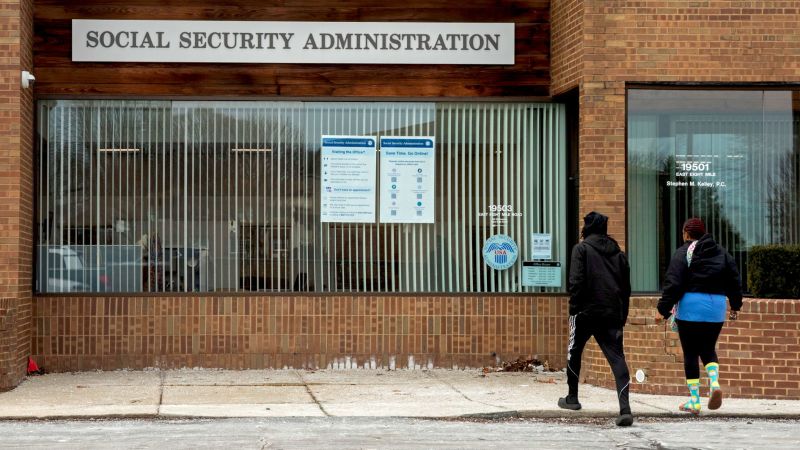CNN
—
A month after instituting a controversial anti-fraud policy that sparked widespread concern among senior citizens, the Social Security Administration has quietly dropped a key piece of the measure.
The agency will no longer hold retirement benefit applications for three days to check for fraud, according to an email sent to workers and reviewed by CNN. The decision comes as the backlog in retirement benefit claims has swelled to nearly 575,000 applications, and employees, whose ranks have thinned from downsizing efforts, are being encouraged to work harder to process those claims.
Pushed by Elon Musk’s Department of Government Efficiency, the anti-fraud policy was revised several times before being implemented amid an outcry from advocates for senior citizens and people with disabilities. Originally, the agency wanted to bar applicants from filing for benefits over the telephone, arguing that it could not do sufficient identity verification. Instead, people would have had to confirm their identities through their online “my Social Security” account or visit a field office to complete the claim in person. Advocates feared that the policy would make it harder for many folks to file for claims, particularly if they are not computer-savvy or live far from the agency’s offices.
The policy change, along with a related one ending beneficiaries’ ability to update their direct deposit information over the phone, prompted senior citizens and people with disabilities to flood the agency’s phone lines and field offices with concerns. Many thought they had to prove their identities to continue receiving payments or had questions about the new procedures.
Less than two weeks later, Social Security announced that the anti-fraud policy would only apply to those filing for retirement, survivors or family benefits over the phone, and its rollout would be delayed by two weeks to April 14. The phone claims would be subject to a fraud review, and if irregularities were detected, applicants would have to go to a field office to prove their identity.
Asked about the latest change in policy, a Social Security spokesperson said the agency “continues to refine the anti-fraud algorithm to flag only the claims with the highest probability of fraud. Continuous improvements will ensure timely processing of claims while protecting beneficiaries from fraud.”
However, the review process only found two cases – out of more than 110,000 claims – that had a high probability of being fraudulent, according to an internal document obtained by Nextgov/FCW, which covers technology in federal agencies. Fewer than 1% of claims were flagged as potentially fraudulent.
What’s more, the anti-fraud checks delayed the processing of retirement claims by 25% and led to worse customer service, according to the May document.
“It created a problem in customer service where one didn’t exist, and it didn’t do anything to prevent fraud,” said Kathleen Romig, director of Social Security and disability policy at the left-leaning Center on Budget and Policy Priorities, who worked at the agency during the Biden administration.
As of mid-May, Social Security had nearly 575,000 pending retirement claims, with about 140,000 of them languishing for at least 60 days, according to an email from Stephen Evangelista, Social Security’s deputy commissioner for operations, that was sent to employees and viewed by CNN. He noted that the agency is receiving a record number of claims this year for several reasons, including the peak wave of Baby Boomers hitting retirement age and a law passed by Congress that beefed up Social Security benefits for nearly 3 million federal, state and local workers.
The backlog began increasing swiftly last fall, shooting up from fewer than 350,000 pending claims in September to nearly 600,000 pending claims in April, according to Social Security data posted online.
Evangelista urged workers in the field offices and another unit to “do their very best” to increase the number of retirement claims they clear every day by at least 10% for the rest of May.
“I am calling for a sprint – a focused, concerted effort in all offices beginning today and lasting through the end of May – to address this growing backlog of pending retirement and survivor claims,” he wrote.
The missive did not go over well with many employees, said Joel Smith, president of the American Federation of Government Employees Local 3184, which represents workers in nearly 100 agency offices across the South and Southwest.
Social Security is in the midst of culling about 7,000 workers, or roughly 12%, from its staff – offering two rounds of deferred resignation offers, as well as other buyout and early retirement incentives. Multiple field offices have lost sizeable shares of their staff. And while the agency is reassigning about 1,000 employees from headquarters and regional offices to work in field offices and other mission-critical units, it will take time to train them.
“Employees find it to be another sign of disrespect from an out-of-touch agency leadership,” Smith said of the directive. Workers “weren’t looking for another demotivational email from an agency leadership that cut their telework, encouraged them to quit and created an unnecessary backlog.”

